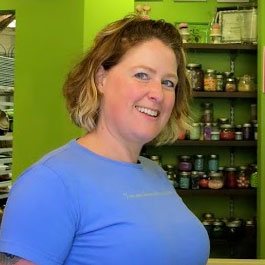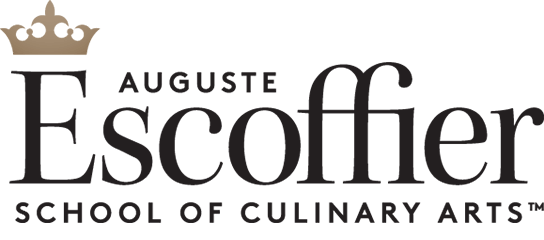
Associate of Applied Science
Degree in
Pastry Arts

“I chose Auguste Escoffier School of Culinary Arts because of the hands-on environment, attention to detail and the reputation of the school. My education far exceeded my expectations. The Chef Educators really care about teaching and are open to working with any student that wants help. My class was made up of people with all levels of skill and from all parts of the country. This really enhanced the experience, because we learned from each other.”*
Monica Paredes
Program Highlights

Hands-On Training

Small Class Sizes

Classic & Contemporary Techniques

Specialty Diets & Artisanal Baking

Industry Externship

Experienced Chef Educators

Career Services Support

Nationally Accredited
Stacey, Sous Chef, Sway Austin*
Associate of Applied Science Degree in Pastry Arts
60 Weeks

Additional lecture courses
24 weeks of
hands-on training
12 weeks of industry externship
Curriculum
Fundamentals of Baking & Pastry
The Fundamentals of Baking and Pastry 6-week class begins with course work concentrating on food safety and sanitation in the professional kitchen. The importance of proper hygiene, food handling and storage, cleaning, pest control and HACCP in a food service operation is explored.
Restaurant Operations
Three out of five restaurants fail within five years of opening, often due to money mismanagement; this course gives students the skills to not only keep their restaurant in business but also turn a profit.
In this course, students study the hierarchy of management in food service, and the skills needed to succeed as a manager: training employees, motivating them, disciplining them, and creating a safe and positive work environment.
Patisserie
The Patisserie 6-week class begins with learning the classic meringue techniques that lead into the creation of European buttercreams. Students will learn classic mixing methods and piping skills. Specialty dessert cakes and decorated special occasion cakes are a major focus of this course work concentrating on factors related to the baking industry.
Professional Communications
The Professional Communications course emphasizes the principles and practical application of effective professional communication behaviors within professional, business, and organizational contexts. In addition to identifying the importance of effective communication skills to the hospitality industry, communication styles and effective listening methods are addressed.
World History & Culture
Throughout history, food has done more than just provide nourishment. From prehistoric times to the present day, food and the pursuit of it has had a transformative role in human history. Food has impacted societal organization, industrial development, military conflict, and economic expansion. This course examines the role of food and its contribution and influence over history, culture, religion, economics, and politics. Food customs and attitudes are also explored, as well as, the social awareness selected food patterns and customs.
Confiserie and Artisan Baking
The Artisan Bread 6-week course provides the framework to understand the principles of the following methods and techniques: the methods of pre-fermentation, biga, and sponge, starting and maintaining a variety of sourdough starters, extended fermentation, the 10 steps of bread production, proper shaping, proofing and scoring, whole grain breads, Italian artisan breads, enriched breads, and special occasion/holiday breads, puff pastry and laminated dough.
College Algebra
MA130 is an intermediate-level course in algebra. This course includes topics in equations and inequalities, graphing lines and circles, functions and their graphs, polynomial and rational functions, and exponential and logarithmic functions.
Technical Writing
Technical Writing, prepares students to write in the hospitality and food service professions. In a professional setting, writing provides readers information they need in a format they can understand.
Global and Contemporary Cuisine
This course explores the cultural differences of desserts, as well as the history and importance of international desserts from regions such as Latin America, Spain, Portugal and Morocco, Italy, Africa, Asia, Caribbean and Germanic Countries.
The Science of Nutrition
In the Science of Nutrition course, the basic principles of nutrition are investigated. Emphasis is placed on the nutrients, food sources, and their utilization in the body for growth and health throughout life. Contemporary and global nutritional issues are also discussed.
Culinary Entrepreneurship
This course covers such topics as business planning, pricing, credit management, government regulation, and legal concerns. Business ethics and the crucial role and importance of management and leadership are also covered.
Industry Externship I
Students gain relevant experience by working in an approved food service establishment. Students are required to satisfy 180 working hours and complete other mandatory assignments to fulfill their externship commitment as part of their graduation requirements.
Industry Externship II
Students gain relevant experience by working in an approved food service establishment. Students are required to satisfy 180 working hours and complete other mandatory assignments to fulfill their externship commitment as part of their graduation requirements.

“My experience in the Pastry Arts program made all the difference for me. I went into the program as a good baker; I came out a professional baker.”*
Stacy Walker
A Typical Week at Escoffier
30 hours per week on campus
5 to 10 hours per week for work outside of class
Class format consists of research, planning, discussion, experience, feedback and reflection
4 kitchen courses and additional lecture courses and 12 week industry externship experience
Online interface for course materials so all resources are in one place
Tuition
TOTAL PROGRAM COST:
$37,370*
*Total program cost includes tuition, uniform, and tool kit. The Associate of Applied Science Degree in Pastry Arts cost also includes course packs. The cost of books is not included. Students may choose to purchase books when enrolling. For more cost details, see the catalog.

“I learned a lot. My chef educators took a difficult task, really broke it down and challenged us to retrace our steps even when we made mistakes to understand why the pastry may not have turned out perfectly. This helped to both expand our knowledge and understand the science behind the art.”*

